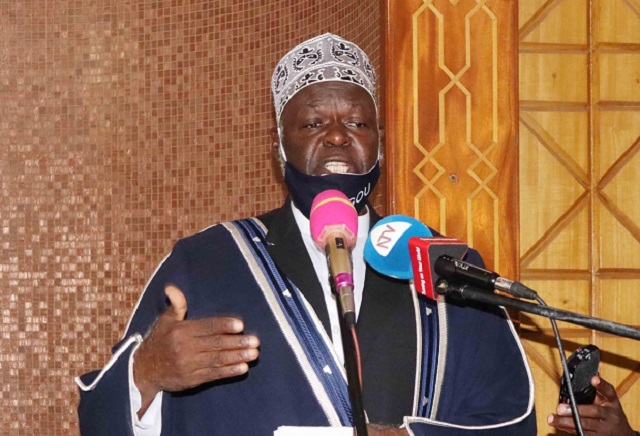
Kampala, Uganda | THE INDEPENDENT | The court has halted further implementation of resolutions made in a General Assembly of the Uganda Muslim Supreme Council that resulted in the appointment of Sheikh Abdallah Ssemambo as the acting Mufti of Uganda.
The acting Principal Judge Lady Justice Alexandra Nkonge issued the directive on Friday morning pending the determination of the case seeking to set aside an order that resulted in the appointment. In her decision, the Lady Justice said that while she had the powers to issue temporary relief, she lacked jurisdiction to handle the entire prayers sought by the Uganda Muslim Supreme Council in this case.
The ruling follows submissions made by the parties before the Land Division of the High Court sitting in Kampala on Thursday. The issues here arise from a petition filed by three Muslims namely; Yudaya Babirye, Burhan Namanya, and Hussein Ssimbwa against the Uganda Muslim Supreme Council-UMSC in Jinja High Court.
Their petition highlighted concerns about the Council’s conduct, particularly the sale of Muslim properties in the country which they said was unfair. As a result, they asked the Jinja court to dissolve the council, a prayer that was never granted on grounds that it would do more harm than good.
Consequently, on December 12, 2023, the Jinja High Court Judge Farida Shamilah Bukirwa Ntambi allowed their petition and issued several orders, which included allowing a special sitting of the Supreme Council, in a neutral venue, to review the affairs of the council.
Following the order, a group of Muslim faithfuls sat at Gangu Primary School and elected Sheikh Ssemambo as the Acting Mufti taking over the role and mandate of Sheik Shaban Mubaje. In the Assembly, they also suspended Sheikh Shaban Ramathan Mubajje the Mufti for six months pending investigations into the alleged mismanagement of Muslim affairs.
The Uganda Muslim Supreme Council is now seeking redress and has asked the Principal Judge to set aside the decision. Represented by Kabega, Bogezi, and Bukenya Advocates, the council argued that failure to review the decision would lead to irreparable losses, business disruptions, and potential breaches of peace, beyond any compensatory damages.
In an affidavit sworn by Deputy Secretary General Haji Ali Aluma, the Uganda Muslim Supreme Council argues that Justice Bukirwa acted over and above her powers when she granted the applicants who are not enlisted members of the General Assembly powers to convene the special general assembly.
Uganda Muslim Supreme Council also argued that the said assembly violated the provisions of their constitution when it was convened without a seven-day notice detailing the agenda and purpose of the meeting to members.
Uganda Muslim Supreme Council also argues that the judge failed to give them a chance to appear and cross-examine the applicants and that the said resolutions resulting from the meeting were passed without the required quorum of the general assembly.
The Council emphasized that suspending Mufti Mubaje and appointing Sheikh Ssemambo had caused anxiety and tension among the Muslim community, potentially leading to unrest. Additionally, they alleged that Babirye, Namanya, Ssimbwa, and their associates were planning an attack on the headquarters of the Uganda Muslim Supreme Council.
In response, Babirye, Namanya, and Ssimbwa, represented by lawyer Luyimbazi Nalukoola, urged the Acting Principal Judge to dismiss the application, asserting that the Court lacked the authority to review the decision. Nalukoola stated that only the Judge who issued the decision could review it and argued that the events had rendered the orders obsolete, making them ineligible for review.
On Friday morning, Nkonge ruled that the court doesn’t have jurisdiction on the matter saying that such prayers can only be granted by the court that issued the orders. The court has also noted that the resolutions made by the General Assembly which were the basis of the prayers sought in the application were only mentioned in the affidavit supporting the application for review.
However, the Judge explained that section six of the Civil procedure gives her powers and authority to make interlocutory orders as may appear to be just and convenient. She ordered that the file be sent back to the Jinja High Court Judge for review.
Accordingly, Nkonge ordered that further execution and implementation of the resolutions of the General Assembly made on December 16 and 17 in Company Cause number 002 of 2023 shall await the hearing and determination of the application by the same judge who made the orders.
The crisis within UMSC arose from the sale of Sembabule Muslim land to businessman Justus Kyabahwa, which was not surrendered as agreed upon.
********
URN
 The Independent Uganda: You get the Truth we Pay the Price
The Independent Uganda: You get the Truth we Pay the Price



